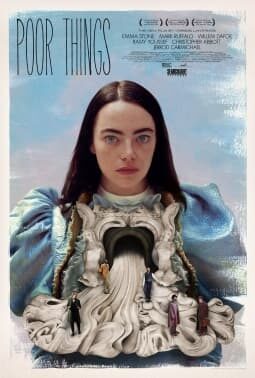One-line review: Awakening through sexual awakening.
When I watched the film for the first time, it was a sensory overload, with little breathing space to savor. But the second time was a seamless immersive experience, and I marveled at how this complicated movie did not make a single misstep. The film is based on Alasdair Gray’s book, and although director, Yorgos Lanthimos, had Gray’s blessings as early as 2009, the film could not be made during Gray’s lifetime. This was because Lanthimos did not have the credentials then to secure financing for such a fantastical and risky film. Thankfully for us, he held on to his dream, and with a few unique yet mainstream hits like The Lobster and The Killing of a Sacred Deer under his belt, and his muse Emma Stone by his side (she is also a producer), this time financing came through, and a masterpiece was born.
The film is a tribute to Frankenstein, except that here the monster is a loving and irresistible beauty whose creator reluctantly sets free to explore the world. She, much to our delight, eventually takes over control (watch out AI bosses). Tony McNamara’s witty script is the film’s backbone. It is sparse, yet the characters are meaty. Lanthimos shot most of the film in elaborately constructed sets in Budapest and despite the pink skies and the meticulous positioning of the characters like in a picture frame (a cross between Renoir and Wes Anderson), the film feels real.
We first see the mad scientist, Godwin Baxter (Willem Dafoe) lovingly watch his creation Bella Baxter (Emma Stone) clumsily play the piano with her feet and hands. She is a child in a woman’s body (we soon know how and why). Their love is mutual, she calls him God, and he encourages her curiosity, even if entails going outdoors and becoming the object of stares and ridicule. Baxter hires his student Max McCandles (Ramy Youssef) to observe and record Bella’s mental and physical growth, which is happening at a remarkable pace. Her physical growth is happening with her movements, from unsteady and childlike to a normal adult’s walk. As Bella becomes more headstrong about exploring the world, Baxter decides to get her married to Max, who is already in love with her, on the condition that they will forever stay with him. Enter, Baxter’s lawyer Duncan Wedderburn, who is curious to see this woman, so precious to warrant such a contract, and blown away by this free-spirited creature. Duncan, an incorrigible womanizer, urges Bella to run away with him to Lisbon, which she does as Godwin and Max watch helplessly.
Bella and Duncan’s adventures do not go as planned, at least for Duncan. The famously no-strings-attached Duncan falls in love with Bella, who is slowly outgrowing him especially after she discovers books. Bella’s main curiosity is the pleasures of sex, which she calls furious jumping, and she is insatiable, and determined to explore it to its fullest. Bella and Duncan lose their money and are thrown off the ship in Paris (Duncan takes her on a cruise so she cannot wander away). Bella looks for food and lands up in a brothel and is amazed she can make money for having sex. Duncan is shocked and leaves her when she tells him how she bought food. Bella goes back to the brothel where under the care of the tough, yet loving Madam Swiney (Katherine Hunter) Bella wondrously discovers the big bad world of prostitution, but she enjoys sex and sees it as employment, she even fights for women’s rights and educates some of the men who visit her. She eventually returns to Godwin because he is dying, and just as she is getting ready to marry Max, her past is revealed. She goes back, but not for long, and in a strange twist of circumstances, Bella, now at the peak of her mental powers, takes charge of her circumstances (and that of her loved ones).
What makes the film so moving is its compassion. Bella is guileless and upright, and even as a prostitute, sees sex as a moment of connection; it helps that she enjoys it. The assembly of the actors playing her clients is genius, each has an unforgettable face and distinctive character despite having only a couple of seconds of screen time. The film’s nudity and unabashed sex scenes may not be for all, but never do the sex scenes seem raunchy: they are all part of Bella’s education and empowerment and a lens into our prejudices. Everyone, including her clients, is better off having met the pure Bella.
The film is controlled chaos and would not have worked without Lanthimos’ extensive planning. The sets were so meticulously designed that Dafoe says he felt comfortable in his house and could pick up a book and read about ancient anatomy. To get Bella’s movements right, her life was mapped into five stages with specific movements for each, the only reason Emma Stone was able to shoot the first and last scene of the film in the same schedule. Lanthimos also sent the actors for a couple of weeks of play, so they got comfortable and secure with each other. Holly Waddington’s costumes deserve special mention, they are period yet modern, and the sleeves manage to stand out in a saturated costume market (below is a pic of the actual costumes on display at the AMC, Lincoln Center).

All this groundwork allows Emma Stone to blaze through the film; she is a force of nature, real, and unhinged. You watch with awe and affection knowing she is giving it her all, but in service of the story. I fully appreciated Dafoe’s nuanced performance as the pained scientist only on the second watch. Mark Ruffalo is a casting coup; Lanthimos says he knew Ruffalo’s reputation as the perennial bankable good guy would create some interesting friction if he played the feckless Duncan, and Ruffalo fully owns the character complete with pouts. Youssef is excellent as the suffering yet upright Max, whose unconditional love for Bella changes his own biases. The other excellent cast includes the worldly-wise Katherine Hunter; it is easy to believe she was the toast of the town in her younger days. Carefully tucked away in the film like an Easter Egg is the great German actress Hanna Schygulla who appears as Martha Von Kurtzroc, on the cruise ship, and takes Bella’s mind away from sex to introduce her to equally empowering the world of books. The firebrand Schygulla, at her peak, was German Director Fassbinder’s muse and still looks and acts delectably. Another Lanthimos casting coup.
The film’s music is its shadow, and who would think this is English musician Jerskin Fendrix’s first film score? This is also the first time Lanthimos is using an original score for a film. Fendrix did not score the film the traditional way by watching the scenes, and sometimes the singular piano keys are played deafeningly loud, but they neatly fill in the gaps of this unhinged film. Cinematographer Robbie Ryan gives the film its surreal through muted light interspersed with bursts of color; he says Stone kicked the handheld camera in the famous dance scene of Bella and Duncan.
The film, like Bella’s sexual awakening, is an assault on all your senses; you leave satiated but know you will return for another go soon.


